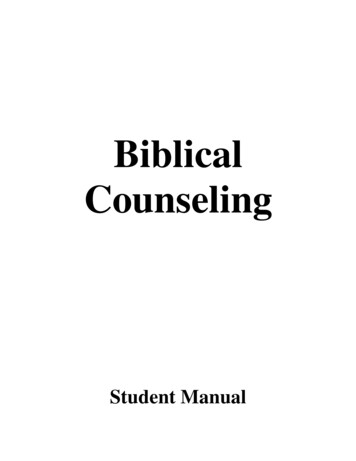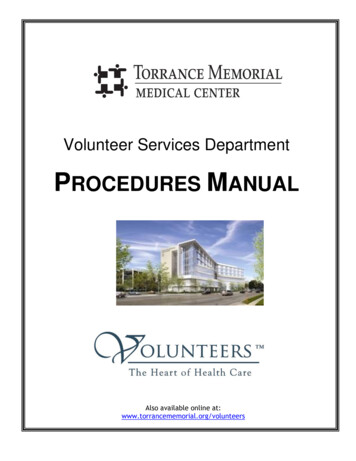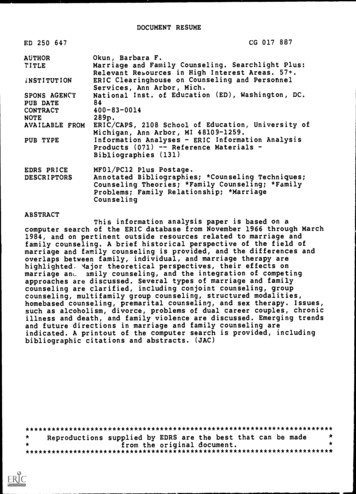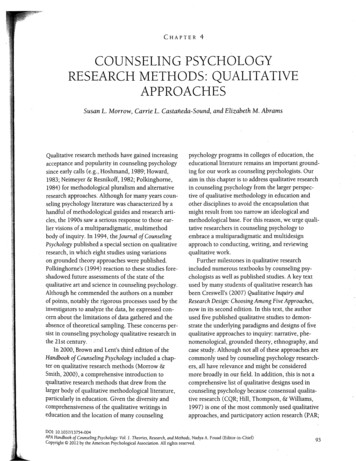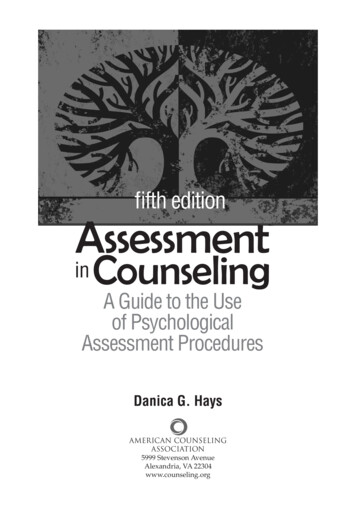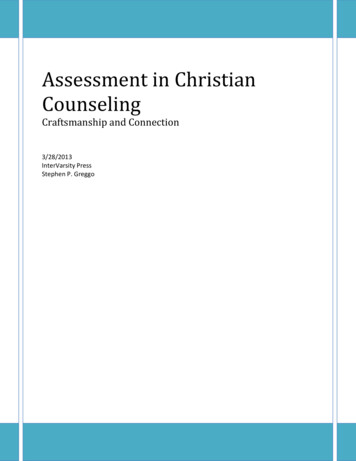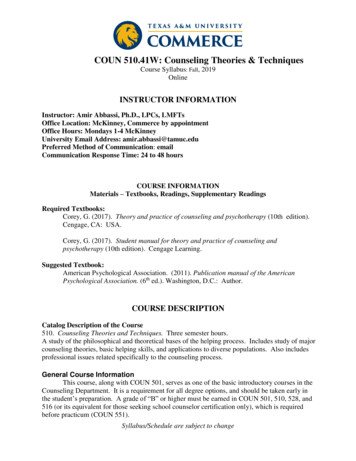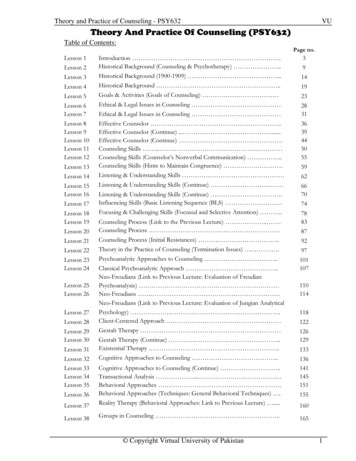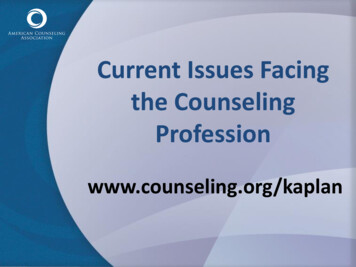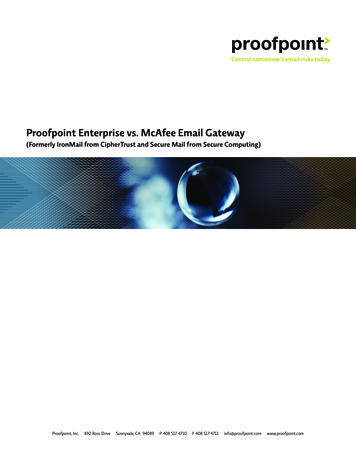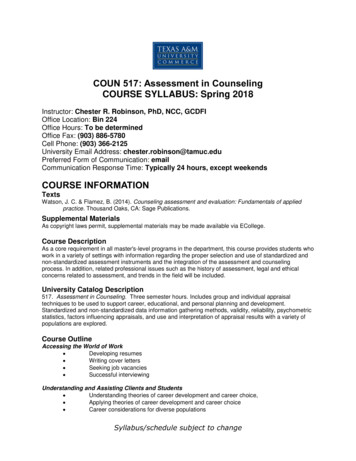
Transcription
COUN 517: Assessment in CounselingCOURSE SYLLABUS: Spring 2018Instructor: Chester R. Robinson, PhD, NCC, GCDFIOffice Location: Bin 224Office Hours: To be determinedOffice Fax: (903) 886-5780Cell Phone: (903) 366-2125University Email Address: chester.robinson@tamuc.eduPreferred Form of Communication: emailCommunication Response Time: Typically 24 hours, except weekendsCOURSE INFORMATIONTextsWatson, J. C. & Flamez, B. (2014). Counseling assessment and evaluation: Fundamentals of appliedpractice. Thousand Oaks, CA: Sage Publications.Supplemental MaterialsAs copyright laws permit, supplemental materials may be made available via ECollege.Course DescriptionAs a core requirement in all master's-level programs in the department, this course provides students whowork in a variety of settings with information regarding the proper selection and use of standardized andnon-standardized assessment instruments and the integration of the assessment and counselingprocess. In addition, related professional issues such as the history of assessment, legal and ethicalconcerns related to assessment, and trends in the field will be included.University Catalog Description517. Assessment in Counseling. Three semester hours. Includes group and individual appraisaltechniques to be used to support career, educational, and personal planning and development.Standardized and non-standardized data information gathering methods, validity, reliability, psychometricstatistics, factors influencing appraisals, and use and interpretation of appraisal results with a variety ofpopulations are explored.Course OutlineAccessing the World of Work Developing resumes Writing cover letters Seeking job vacancies Successful interviewingUnderstanding and Assisting Clients and Students Understanding theories of career development and career choice, Applying theories of career development and career choice Career considerations for diverse populationsSyllabus/schedule subject to change
2 Selecting and implementing career interventions Role of assessment and appraisal in career interventionsUnderstanding the World of Work Role of work in America and Americans' lives Locating and accessing occupational and career information Using occupational and career information Role of technologyCareer Development Programs and Services Elementary school interventions Middle and junior high school interventions Secondary school interventions Post-secondary school interventions Community-based interventionsStudent Learning Outcomes (CACREP standard in parentheses)Course ObjectivesStudents will demonstrate an understanding of: historical perspectives concerning the nature and meaning of assessment and testing incounseling (F7a)methods of effectively preparing for and conducting initial assessment meetings (F7b)use of assessments for diagnostic and intervention planning purposes (F7e)basic concepts of standardized and non-standardized testing, norm-referenced and criterionreferenced assessments, and group and individual assessments (F7f)statistical concepts, including scales of measurement, measures of central tendency, indices ofvariability, shapes and types of distributions, and correlations (F7g)reliability and validity in the use of assessments (F7h)use of assessments relevant to academic/educational, career, personal, and social development(F7i)use of environmental assessments and systematic behavioral observations (F7j)use of symptom checklists, and personality and psychological testing (F7k)use of assessment results to diagnose developmental, behavioral, and mental disorders (F7l)ethical and culturally relevant strategies for selecting, administering, and interpreting assessmentand test results (F7m)use of intake interviews, mental status evaluations, biopsychosocial histories, mental healthhistories, and psychological assessments for treatment planning and caseload management(CMHC C3a)assessments specific to P-12 education (SC G1e)use of developmentally appropriate career counseling interventions and assessments (SC G3e)TExES Competencies for School Counselors that relate to this course Competency 002 (Student Diversity)o The school counselor understands human diversity and applies this knowledgeto ensure that the developmental guidance and counseling program isresponsive to all students. Competency 003 (Factors affecting Students)o The school counselor understands factors that may affect students’development and school achievement and applies this knowledge to promotestudents’ ability to achieve their potential.
3 Competency 007 (Assessment)o The school counselor understands principles of assessment and is able to useassessment results to identify students’ strengths and needs, monitorprogress, and engage in planning to promote school success. Competency 010 (Professionalism)o The school counselor understands and complies with ethical, legal, andprofessional standards relevant to the profession.Methods of InstructionReadings, lecture transcripts, threaded discussion, small group activities, and supervised applications.COURSE REQUIREMENTSPrerequisitesAdmission to Graduate Studies at Texas A&M University-Commerce. In addition, students are expectedto be able to: 1) Navigate the World Wide Web using a web browser (e.g., Safari, Explorer, Opera,Firefox, Chrome) and a search engine (e.g., Google); 2) Communicate electronically via email; 3) Sendattachments via email; and, 4) Use a word processing computer program, preferably MS Word.TestsFive (5) tests will be completed during the term. Test items will be drawn from lectures,text, and assigned readings. Test items have been designed to address all levels of Bloom’s(Anderson & Krathwohl, 2001; Bloom, Engelhart, Furst, Hill, & Krathwohl, 1956) taxonomy.Thus, you will often encounter items for which responses are not readily found directly inthe text or lessons. Instead, discerning the correct response will require you to have an indepth understanding of the concepts upon which the item is based. There is no set schedulefor completing tests. All tests must be completed by on the last day of the semester. Finalgrade value: 30%AssignmentsDiscussions - Students are expected to participate in 8 biweekly discussions hostedasynchronously in ECollege. I will post a discussion prompt by midnight on alternateSundays. You are expected to respond to that prompt by 11:59 p.m. on the followingWednesday and to respond to at least 3 classmates’ contributions by 11:59 p.m. thefollowing Friday. Twenty possible points can be earned for each weekly discussion,distributed as follows: Your initial contribution – 10 points; first response to a classmate’scontribution – 5 points; second response to another classmate’s contribution – 3 points;third response to another classmate’s contribution – 2 points; having the last word –PRICELESS! Final grade value: 30%.Assessment Instrument Completion and Reaction - I will identify 2 assessments available at nocharge for on-line completion or for downloading, printing, and written completion. You areto complete these, then submit a 1-2 page reaction for each in which you discuss yourexpectations regarding the assessment, the complexity/simplicity of the items, theperceived relevance of the measure, your anticipated results versus your actual results, etc.A Drop Box will be designated to which you will submit each review. Here are the links forthis assignment:Final grade value: 20%Assessment Instrument Results/Interpretation Presentation– Students will be presented with resultsfrom related assessments, depending upon program emphasis – CMHC or SC. From these, students will
4prepare a written interpretation for either the client (CMHC) or student’s parents (SC). Additionalassignment guidelines and requirements will be provided during the semester.Late Assignments - Occasionally, students require "extra" time in order to complete an assignment. Oneadditional week may be "purchased" with 10% of the possible grade for an assignment. For example,Harry is unable to complete and submit his Internet Scavenger Hunt on time. The maximum grade Harrycan receive now on his Hunt is 90%. Please note that extra time cannot be purchased for submitting yourown resume for critique. Others cannot complete their assignments until your resume is uploaded intoDoc Sharing. Extra time cannot be purchased for completing tests.GRADINGFinal grades in this course will be based on the following scale:A 90%-100%B 80%-89%C 70%-79%D 60%-69%F 59% or BelowClinical Mental Health Counseling, School Counseling, and Core CACREPStandards Addressed in Course:CMHCStandardsCourseCOUN517C3a.XLearning Activity/Delivery &ResourcesDelivery: Lecture, Readings, inClass DiscussionResources: Main class textWhiston (2013)SCStandardsG1e.G3e.CourseCOUN517XDelivery: Lecture, Readings, inClass DiscussionResources: Main class textMain class text Whiston (2013)Delivery: Lecture, Readings, inClass DiscussionResources: Main class textMain class text Whiston (2013)AssessmentTests, Discussions, andAssignments (Review;Interpretation Project)Tests, Discussions, andAssignments (Review;Interpretation Project)XCoreStandard7a7bLearning Activity/Delivery &ResourcesAssessmentTests, Discussions, andAssignments (AssessmentInstrument Review;Interpretation Project)Delivery/Activity/Resource517517Readings: Ch 1; TranscribedLectures; Threaded DiscussionsReadings: Ch 6; TranscribedAssessmentTests, Threaded DiscussionsTests, Treaded Discussions
ures; Threaded DiscussionsReadings: Ch 12, 13;Transcribed Lectures; ThreadedDiscussionsReadings: Ch 2; TranscribedLectures; Threaded DiscussionsReadings: Ch 2; TranscribedLectures; Threaded DiscussionsReadings: Ch 3, 4; TranscribedLectures; Threaded DiscussionsReadings: Ch 7, 8, 9;Transcribed Lectures; ThreadedDiscussionsReadings: Ch 5; TranscribedLectures; Threaded DiscussionsReadings: Ch 10; TranscribedLectures; Threaded DiscussionsReadings: Ch 6, 7, 10;Transcribed Lectures; ThreadedDiscussionsReadings: Ch 5, 14, 15;Transcribed Lectures; ThreadedDiscussionsTests, Threaded Discussions,Interpretation ProjectTests, Threaded DiscussionsTests, Threaded DiscussionsTests, Threaded DiscussionsTests, Threaded Discussions,Assessment Instrument ReviewTests, Threaded DiscussionsTests, Threaded Discussions,Assessment Instrument ReviewTests, Threaded DiscussionsTests, Threaded Discussions,Interpretation ProjectTECHNOLOGY REQUIREMENTS To fully participate in online courses you will need to use a current Flash enabledbrowser. For PC users, the suggested browser is Google Chrome or Mozilla Firefox.For Mac users, the most current update of Firefox is suggested. You will need regular access to a computer with a broadband Internet connection.The minimum computer requirements are:o 512 MB of RAM, 1 GB or more preferredo Broadband connection required courses are heavily video intensiveo Video display capable of high-color 16-bit display 1024 x 768 or higherresolution You must have a:o Sound card, which is usually integrated into your desktop or laptopcomputero Speakers or headphones.o *For courses utilizing video-conferencing tools and/or an online proctoringsolution, a webcam and microphone are required. Both versions of Java (32 bit and 64 bit) must be installed and up to date on yourmachine. At a minimum Java 7, update 51, is required to support the learning
6management system. The most current version of Java can be downloaded at:JAVA web site http://www.java.com/en/download/manual.jsp Current anti-virus software must be installed and kept up to date. Run a browser check through the Pearson LearningStudio Technical Requirementswebsite. Browser Check http://help.ecollege.com/LS Tech Req WebHelp/enus/#LS Technical Requirements.htm#BrowsetRunning the browser check will ensure your internet browser is supported.Pop-ups are allowed.JavaScript is enabled.Cookies are enabled. You will need some additional free software (plug-ins) for enhanced web browsing.Ensure that you download the free versions of the following software:o Adobe Reader https://get.adobe.com/reader/o Adobe Flash Player (version 17 or later) https://get.adobe.com/flashplayer/o Adobe Shockwave Player https://get.adobe.com/shockwave/o Apple Quick Time http://www.apple.com/quicktime/download/ At a minimum, you must have Microsoft Office 2013, 2010, 2007 or Open Office.Microsoft Office is the standard office productivity software utilized by faculty,students, and staff. Microsoft Word is the standard word processing software,Microsoft Excel is the standard spreadsheet software, and Microsoft PowerPoint isthe standard presentation software. Copying and pasting, along withattaching/uploading documents for assignment submission, will also be required. Ifyou do not have Microsoft Office, you can check with the bookstore to see if theyhave any student copies. For additional information about system requirements, please see: SystemRequirements for dex.learn?action technicalACCESS AND NAVIGATIONPearson LearningStudio (eCollege) Access and Log in InformationThis course will be facilitated using Pearson LearningStudio, the learning managementsystem used by Texas A&M University-Commerce. To get started with the course, go tomyLeo. http://www.tamuc.edu/myleo.aspxYou will need your CWID and password to log in to the course. If you do not knowyour CWID or have forgotten your password, contact Technology Services at903.468.6000 or helpdesk@tamuc.edu.
7It is strongly recommended you perform a “Browser Test” prior to the start of yourcourse. To launch a browser test, login to Pearson LearningStudio, click on the “MyCourses” tab, and then select the “Browser Test” link under Support Services.Pearson LearningStudio Student Technical SupportTexas A&M University-Commerce provides students technical support in the use ofPearson LearningStudio.Technical assistance is available 24 hours a day/ 7 days a week.If you experience LearningStudio (eCollege) technical problems, contact theLearningStudio helpdesk at 1-866-656-5511 (toll free) or visit Pearson 24/7 CustomerSupport Site http://247support.custhelp.com/The student help desk may be reached by the following means 24 hours a day, sevendays a week. Chat Support: Click on 'Live Support' on the tool bar within your course to chatwith a Pearson LearningStudio Representative. Phone: 1-866-656-5511 (Toll Free) to speak with Pearson LearningStudioTechnical Support Representative.Accessing Help from within Your Course: Click on the 'Tech Support' icon on theupper left side of the screen inside the course. You then will be able to get assistancevia online chat, email or by phone.Note: Personal computer problems do not excuse the requirement to complete allcourse work in a timely and satisfactory manner. Each student needs to have a backupmethod to deal with these inevitable problems. These methods might include theavailability of a backup PC at home or work, the temporary use of a computer at afriend's home, the local library, office service companies, an Internet cafe, or abookstore, such as Barnes & Noble, etc.Policy for Reporting Problems with Pearson LearningStudioShould students encounter Pearson LearningStudio based problems while submittingassignments/discussions/comments/exams, the following procedure MUST be followed:1. Students must report the problem to the help desk. You may reach the helpdeskat 1-866-656-5511.2. Students MUST file their problem with the helpdesk and obtain a helpdesk ticketnumber3. Once a helpdesk ticket number is in your possession, students should email meto advise me of the problem and to provide me with the helpdesk ticket number
84. At that time, I will call the helpdesk to confirm your problem and follow up withyouPLEASE NOTE: Your personal computer/access problems are not a legitimate excusefor filing a ticket with the Pearson LearningStudio Help Desk. You are stronglyencouraged to check for compatibility of your browser BEFORE the course begins andto take the Pearson LearningStudio tutorial offered for students who may require someextra assistance in navigating the Pearson LearningStudio platform. ONLY PearsonLearningStudio based problems are legitimate.myLeo SupportYour myLeo email address is required to send and receive all student correspondence.Please email helpdesk@tamuc.edu or call us at 903-468-6000 with any questions aboutsetting up your myLeo email account. You may also access information at myLeo.https://leo.tamuc.eduLearner SupportGo to the following link One Stop Shop- created to serve you by attempting to provideas many resources as possible in one op/Go to the following link Academic Success Center- focused on providing academicresources to help you achieve academic ices/academicSuccessCenter/FREE MOBILE APPSThe Courses apps for phones have been adapted to support the tasks students can easilycomplete on a smaller device. Due to the smaller screen size course content is not presented.The Courses app is free of charge. The mobile Courses Apps are designed and adapted fordifferent devices.iPhone – Pearson LearningStudio Courses for iPhoneAndroid – LearningStudio Courses - PhoneOperating iPhone - OS 6 and aboveSystem:Android – Jelly Bean, Kitkat, and Lollipop arningstudioApp URL: courses/id977280011?mt 8AndroidApp URL: https://play.google.com/store/apps/details?id com.pearson.lsphoneApp Title:Once downloaded, search for Texas A&M University-Commerce, and it should appearon the list. Then you will need to sign into the myLeo Mobile portal.The Courses App for Android and iPhone contain the following feature set: View titles/code/Instructor of all Courses enrolled in online View and respond to all discussions in individual Courses View Instructor Announcements in individual Courses
9 View Graded items, Grades and comments in individual Courses Grade to Date View Events (assignments) and Calendar in individual Courses View Activity Feed for all courses View course filters on activities View link to Privacy Policy Ability to Sign out Send FeedbackLEARNINGSTUDIO NOTIFICATIONSStudents can be alerted to course activities via text on their mobile phones or up to twoemail addresses.Based on their preferences, students can automatically receive a push notification withevery new: course announcement, threaded discussion post, grade, and/or assignmentwithout having to login to the course. Enrolled students will automatically receive emailnotifications for announcements and can opt out of this feature. To receive textnotifications, students must opt in.To begin setting up notifications, go into your course in LearningStudio and click on thebell-shaped Notifications icon on the main menu ribbon.By default the student’s university email address will appear. This cannot be changedin LearningStudio. Additional email addresses may be added by clicking the Addbutton. After all of the other selections are completed be sure to click the Save andFinish button.COMMUNICATION AND SUPPORTIf you have a concern related to course content, please email(chester.robinson@tamuc.edu), text (903-366-2125), or phone (903-366-2125) me,Chester Robinson. If you are experiencing problems related to eCollege (PearsonLearning Studio), please contact technical support.I prefer emails over phone calls or texts. In most cases, I will respond to emails within24 hours. Response times on weekends will vary.COURSE AND UNIVERSITY PROCEDURES/POLICIESLate AssignmentsOccasionally, students require "extra" time in order to complete an assignment. Oneadditional week may be "purchased" with 10% of the possible grade for an assignment.For example, Harry is unable to complete and submit one of his Assessment InstrumentReviews on time. The maximum grade Harry can receive now on his Hunt is90%. Please note that extra time cannot be purchased for submitting your own resumefor critique. Others cannot complete their assignments until your resume is uploadedinto Doc Sharing. Extra time cannot be purchased for completing tests.
10Syllabus Change PolicyThis syllabus is a guide. Circumstances and events, such as student progress, maymake it necessary for the instructor to modify the syllabus during the semester. Anychanges made to the syllabus will be announced in advance.University Specific ProceduresStudent ConductAll students enrolled at the University shall follow the tenets of common decency andacceptable behavior conducive to a positive learning environment. The Code ofStudent Conduct is described in detail in the Student r/documents/studentGuidebook.pdfStudents should also consult the Rules of Netiquette for more information regardinghow to interact with students in an online forum: es.htmlTAMUC AttendanceFor more information about the attendance policy please visit the Attendance webpageand Procedure 99.R0.01.pdfAcademic IntegrityStudents at Texas A&M University-Commerce are expected to maintain high standardsof integrity and honesty in all of their scholastic work. For more details and thedefinition of academic dishonesty see the following procedures:Undergraduate Academic Dishonesty AcademicDishonesty.pdfGraduate Student Academic Dishonesty emicDishonesty.pdfADA StatementStudents with DisabilitiesThe Americans with Disabilities Act (ADA) is a federal anti-discrimination statute thatprovides comprehensive civil rights protection for persons with disabilities. Among otherthings, this legislation requires that all students with disabilities be guaranteed a
11learning environment that provides for reasonable accommodation of their disabilities. Ifyou have a disability requiring an accommodation, please contact:Office of Student Disability Resources and ServicesTexas A&M University-CommerceGee Library- Room 132Phone (903) 886-5150 or (903) 886-5835Fax (903) 468-8148Email: Rebecca.Tuerk@tamuc.eduWebsite: Office of Student Disability Resources and rimination NoticeTexas A&M University-Commerce will comply in the classroom, and in online courses,with all federal and state laws prohibiting discrimination and related retaliation on thebasis of race, color, religion, sex, national origin, disability, age, genetic information orveteran status. Further, an environment free from discrimination on the basis of sexualorientation, gender identity, or gender expression will be maintained.Campus Concealed Carry StatementTexas Senate Bill - 11 (Government Code 411.2031, et al.) authorizes the carrying of aconcealed handgun in Texas A&M University-Commerce buildings only by persons whohave been issued and are in possession of a Texas License to Carry a Handgun.Qualified law enforcement officers or those who are otherwise authorized to carry aconcealed handgun in the State of Texas are also permitted to do so. Pursuant to PenalCode (PC) 46.035 and A&M-Commerce Rule 34.06.02.R1, license holders may notcarry a concealed handgun in restricted locations.For a list of locations, please refer to the Carrying Concealed Handguns On Campusdocument and/or consult your event organizer.Web loyeesAndStudents/34.06.02.R1.pdfPursuant to PC 46.035, the open carrying of handguns is prohibited on all A&MCommerce campuses. Report violations to the University Police Department at 903886-5868 or 9-1-1.
non-standardized assessment instruments and the integration of the assessment and counseling process. In addition, related professional issues such as the history of assessment, legal and ethical concerns related to assessment, and trends in the field will be included. University Catalog Description 517. Assessment in Counseling. Three semester .
